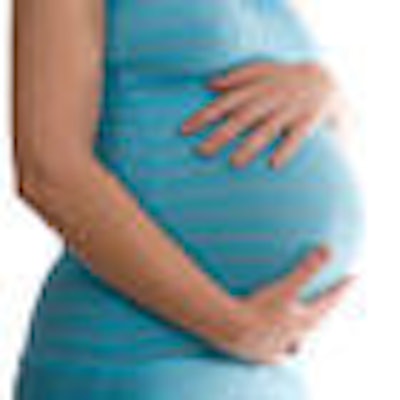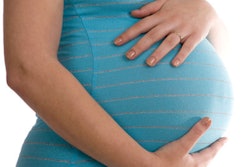
Numerous studies have shown that pregnant women are susceptible to periodontal disease. Now new research (Archives of Gynecology and Obstetrics, May 3, 2011) finds that dentists can target those at high risk by asking a simple question: Do you have tooth mobility and/or swollen gums?
Pregnant and postpartum women are at higher risk of developing periodontal diseases because elevated levels of progesterone and estrogen during pregnancy enhance inflammatory response, altering the gingival tissue, according to lead author Alessandro Villa, DDS, from the department of medicine, surgery, and dentistry at the University of Milan.
Dr. Villa first became interested in this research when reports came out of a possible association between periodontal disease and adverse pregnancy outcomes.
“Self-reported gum swelling and tooth mobility during pregnancy may correspond to the presence of periodontal disease.”
— Alessandro Villa, DDS, University
of Milano
"We thought that this was a new, interesting world to explore," Dr. Villa said. "In addition, we thought that it would be interesting to investigate oral hygiene levels and practices among pregnant women."
To understand oral hygiene practices and periodontal symptoms among postpartum women and assess whether self-reported periodontal symptoms are correlated with a clinical diagnosis of periodontal disease, Dr. Villa and her colleagues developed a questionnaire to assess socio-demographic information, oral hygiene habits, and frequency of dental visits. Additional questions included information on self-reported periodontal symptoms.
The authors looked at data collected from 409 postpartum women between the ages of 20 and 44 who were approached on the postnatal ward of the Hospital Policlinico, Mangiagalli and Regina Elena in Milan.
Relevant data on pregnancy care and outcome were sourced from the medical records of each woman and her infant. Finally, all women received a full-mouth dental and periodontal examination.
Among the study findings:
- More than 99% of the participants brushed their teeth every day.
- Approximately 15% of women brushed their teeth for more than three minutes per day, 64% from one to three minutes, and 21% for one minute.
- Participants most frequently reported going to the dentist annually (59.9%), although a relatively high proportion attended only when in pain (34.7%).
- Periodontal disease was present in about 61% of women.
- Patients with gum swelling and tooth mobility were almost twice as likely to have periodontal disease.
- No associations were found between periodontal disease, gum swelling PTB, and/or LBW.
"We found that only around 50% of the women brushed their teeth more than once a day and 35% seek oral care from a dentist only when they experience pain, thus making prevention less possible," Dr. Villa noted.
At a minimum, healthcare providers should advise pregnant women about proper oral care, she added.
"It was interesting to note that self-reported gum swelling and tooth mobility during pregnancy may correspond to the presence of periodontal disease," Dr. Villa said. "Both dentists and prenatal medical care providers may target pregnant women who might be at higher risk for periodontitis by asking whether they have swollen gums and/or tooth mobility."
This simple question may be useful to promote oral health and good oral hygiene practices among women, she said.
The study authors evaluated previous studies that collected data on periodontal symptoms and found that none of them asked the pregnant women if they had experienced tooth mobility or reported a sensation of swollen gums.
Medical care providers are in a good position to play a major role in preventing periodontal diseases, Dr. Villa said. For example, they could help their patients develop behavioral patterns such that they brush teeth more often and visit a dentist regularly for preventative measures.
"Even though we did not find any association, past research has tied poor dental health to increased risk of adverse pregnancy outcome," the authors concluded. "[Thus], in the absence of definitive data on the association between periodontitis and adverse pregnancy outcome, clinicians should educate pregnant women about the importance of maintaining a good standard for oral health."



















